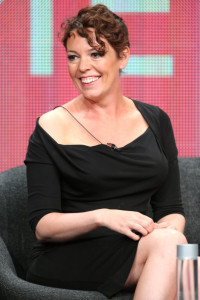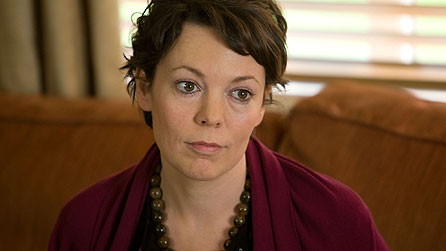 It’s been a busy year for Olivia Colman. Next on screen in an adaptation of The Thirteenth Tale, the acclaimed actress talks to Phil Penfold.
It’s been a busy year for Olivia Colman. Next on screen in an adaptation of The Thirteenth Tale, the acclaimed actress talks to Phil Penfold.
It was a bit a hectic for Olivia Colman in the run-up to the New Year. She’d quite cheerfully agreed to be interviewed, and then turned up just a little late at the agreed venue, which was the BFI on the South Bank in London, and yes, more than a little breathless, and full of genuine apologies.
“I’m off to a wrap party for the new series of Rev,” she explained, and then grinned: “the twinkly silver top I’m wearing is because the theme is ‘Christmas’.” Olivia plays the much-put-upon clergyman’s wife Alex Smallbone in the hit BBC series, which returns in the New Year. And if you can’t get enough of Olivia (and frankly, who can?) there’s a new series of Broadchurch scheduled for the spring, and then a further two dramas for the New Year.
There’s 7.39, which looks at the effect that an affair that develops on a morning commute has on a family’s life, and The Thirteenth Tale, a chilling seasonal ghost yarn shot entirely in Yorkshire during the balmy summer of 2013 which screens over Christmas. Colman, 39, stars opposite screen legend Vanessa Redgrave in a powerful script by Christopher (Les Liaisons Dangereuse) Hampton. It is Hampton’s first TV screenplay in 20 years, and is based on the powerful, and best-selling, novel by Dianne Setterfield, who wrote it while working as a part-time French teacher at Harrogate College. As Olivia draws breath and settles down, the first question has to be why she was first interested in the role. After all, “ghost stories” are notoriously hard to make even slightly credible. Or even scary.
She thinks for a nano-second and smiles: “Look, I could have been offered a co-reading of the phone book with Miss Redgrave and I’d have done it, she’s such a legend and an inspirational actress, but with a script by Mr Hampton, it was a foregone conclusion, a no-brainer. Thinking about it, however, it was an extremely physical – in the emotional sense – part to do. I seem to have been doing a lot of crying in all my recent pieces for TV, because I’ve been playing a lot of unhappy women.
“I’ve got the feeling that when the people who cast films and plays see that you can ‘do crying’, you get a lot of jobs offered on the back of it. But I don’t resort to any trickery, believe me. No onions hidden in hankies or Tiger Balm rubbed under the eyes at the last moment. I just let my emotions come out. And if you’ve got a really five star script, and you find it moving, you can cry.”
Colman plays Margaret, a journalist who is asked by Redgrave’s character, Vida Winter, to come to her home near Ribblehead in North Yorkshire to make notes for a biography. The part struck a particular chord for Colman.
“My mother used to be a nurse in a home for the elderly, and when I was a teenager I’d often go along with her to work and watch as she encouraged the old people to recall their personal stories. The tales that they came out with were wonderful. So many vivid memories and recollections. I found it all so gripping. You’d hear a dear old souls saying things like ‘I went to school in a horse and cart’, and they’d re-live their wonderful lives.
“Margaret arrives to tease out the stories from Vida. What happens, of course, is that she finds them tangled, intriguing, and revelatory. It’s a thriller mixed with a spooky tale, and – I know this is me saying it, but it is true – it becomes more and more compelling”.
Not least, she admits, because of some of the atmospheric places in which the drama was shot.
“How can you film up in North Yorkshire, and not let the surroundings seep into everything that you do? One of the very first scenes is of Margaret getting off the train to Carlisle, and standing there alone at the station….there’s nothing else there. Just the wind and the sky and the moors. And I loved it – it was a magical time.”
The Thirteenth Tale is directed by York-born and Bootham School educated James Kent and the four-week shoot was intense.
“Margaret is a bit confused at first as to why this hugely popular author has asked her to even attempt her life story, but as the story progresses, it all becomes clear. There is a strange bond that both women have. It’s about twins. Twins are fascinating – being flippant, if I may, I always wanted to be a twin, and to be able to dress the other one up and say to her ‘You really do not look good in that’ – isn’t that terrible? There is a strange, almost uncanny bond between twins, and Thirteenth Tale taps so beautifully into that strange little mystery.”
Shot on location at various country estates, including Burton Agnes Hall, Brodsworth Hall and Duncombe Park, The Thirteenth Tale is also something of a showcase for Yorkshire.
“When I looked at the locations where we’d be shooting I thought ‘what a sublime treat this is going to be!’,” says Colman. “I have nothing but complete admiration for their owners and keepers (Brodsworth is in the care of National Heritage) of these houses for what they allowed us to do within their walls. I think it was Mr Cunliffe-Lister at Burton Agnes who said that it came as a bit of a surprise to be ‘taken over’, and to discover that his sublime and priceless Red Drawing Room when we’d finished dressing it up looked as if someone else had moved into his historic home. It was all down to the props department, of course. And we left it completely as we found it when we made our farewells.”
Working with Redgrave, she says, “was inspirational. You sometimes get the opportunity to be in the presence of some great ‘names’ in this industry, and you wonder if they are going to be ‘acting’ or doing it honestly and looking in to your eyes. And The Big V was the latter. She is very tall, very beautiful, very quick, and quite remarkable. And even more admirable because in most of our scenes she is laying down on a couch, or in bed. Now think about it – could you ‘act’ from a prone position?”
Is she a fan of supernatural thrillers herself? “Well, that all depends on how they are done. If they leave something to the audience’s imagination, then yes, I am. But there are so many which are totally bloody obvious, and you think ‘You stupid creature….you’ve just heard a hideous scream from the cellar or the attic for from behind that locked door…..and you are actually going to go towards it, rather than to make the quickest exit that you can?’ That’s just not rational, is it?
“I am a bit of a chicken. I remember watching the original film version of Carrie all those years ago and being totally terrified, but at the same time, loving it.”
Only days after Thirteenth Tale (“Oh God, people will be sick of the sight of me on the box, won’t they?”) comes 7.39, which also stars Yorkshire’s Sheridan Smith.
Colman says: “I’m playing a mum of two – as I am in real-life – whose husband has his head turned by a woman he sees on his way into work. I’m sure that there are a lot of people who regularly commute, same time, same carriage, same bus or train every day, who see the same faces, and who fantasise, but this goes a lot deeper. And Maggie hasn’t got a clue about what is unfolding, and cannot make sense in the changes in her husband.
“I found that so interesting – what happens to the person that you love, and whom you think you know, when they leave the house? The lesson from this one is ‘Let’s appreciate each other more’.”
And, she confides that while she may be one of the most in-demand actors around at the moment, it wasn’t always the case.
“A good few years ago, work was very sparse indeed, and I almost gave up. In fact, just to keep body and soul together, I got another job, and I used to do the dreaded commute myself. I hated it completely. For a start, I am not a morning person and it seems to take ages for my eyes to ‘unglue’.
“When you finally squeeze onto the train, there were fists in your back every day. People treading on your toes. And BO at 8am. Don’t people know how to wash? I hated every second of it, the sheer monotony. It used to make me very, very angry. Being wound up like a two-dollar watch, angry, tense, that’s not a good way to start your day.”
Then she pauses, thinks and chuckles: “Being picked up by a car, however, to drive a few miles to work opposite Vanessa Redgrave, in a lovely house like Burton Agnes…well, now, how jammy, completely, totally, five-star jammy, is that?”
The Thirteenth Tale is on BBC2 on December 30 at 9.30pm.
Source: yorkshirepost.co.uk – The big interview: Olivia Colman


 As the winner of three Bafta awards for Broadchurch, Accused and Twenty Twelve – including two in the same year – you might assume that Olivia Colman spends most of her time either filming or sifting between piles of possible scripts. Counterintuitively, though, greater success has brought more frequent unemployment.
As the winner of three Bafta awards for Broadchurch, Accused and Twenty Twelve – including two in the same year – you might assume that Olivia Colman spends most of her time either filming or sifting between piles of possible scripts. Counterintuitively, though, greater success has brought more frequent unemployment. “It was important to us that the priest is not represented as a complete idiot in the show,” says Tom Hollander. He’s sitting in the over-salubriously wallpapered surroundings of a Soho private members club alongside co-star and on-screen wife Olivia Colman. But they’re here to talk about Rev, the thoughtful, slightly careworn sitcom that’s returning for a welcome third series. “In previous incarnations,” he continues, “whether it was Derek Nimmo or Rowan Atkinson or Father Ted, the priest or vicar is a bit of a twat. Adam Smallbone is the hero, with a very small ‘h’, of Rev. It’s the people around him who are the oddballs.”
“It was important to us that the priest is not represented as a complete idiot in the show,” says Tom Hollander. He’s sitting in the over-salubriously wallpapered surroundings of a Soho private members club alongside co-star and on-screen wife Olivia Colman. But they’re here to talk about Rev, the thoughtful, slightly careworn sitcom that’s returning for a welcome third series. “In previous incarnations,” he continues, “whether it was Derek Nimmo or Rowan Atkinson or Father Ted, the priest or vicar is a bit of a twat. Adam Smallbone is the hero, with a very small ‘h’, of Rev. It’s the people around him who are the oddballs.”